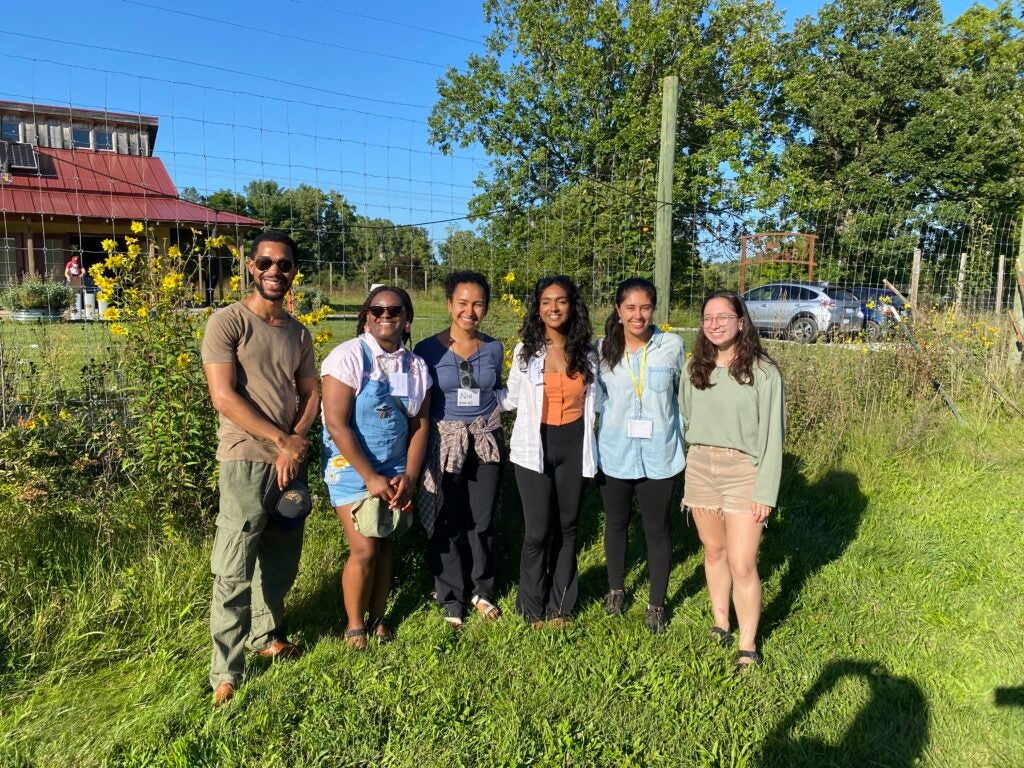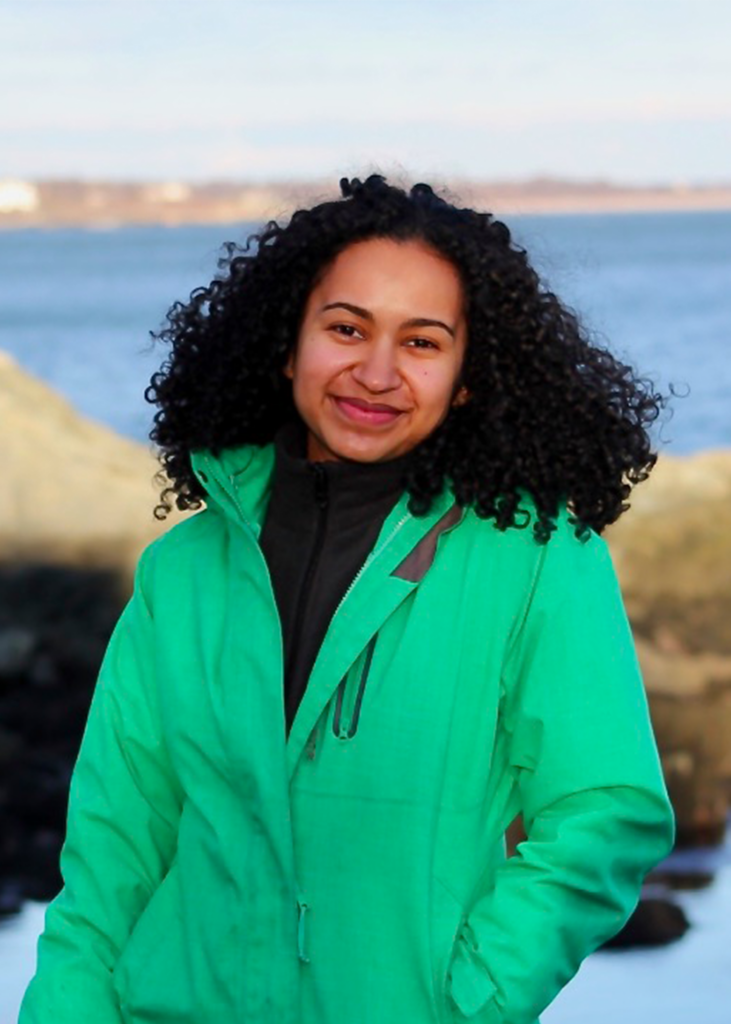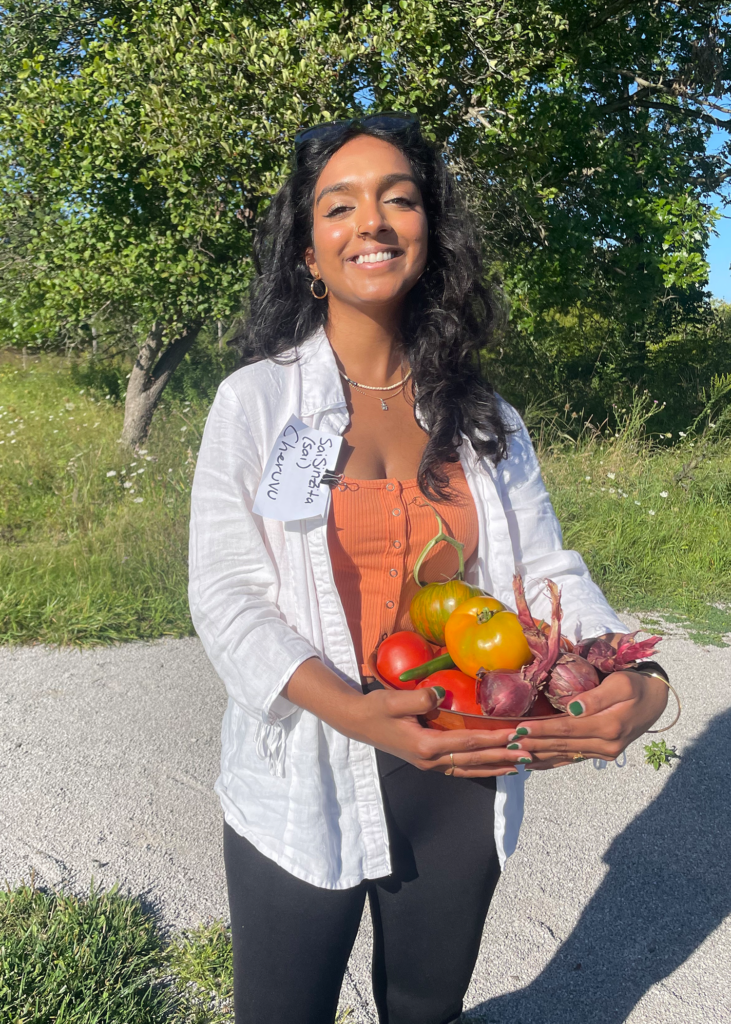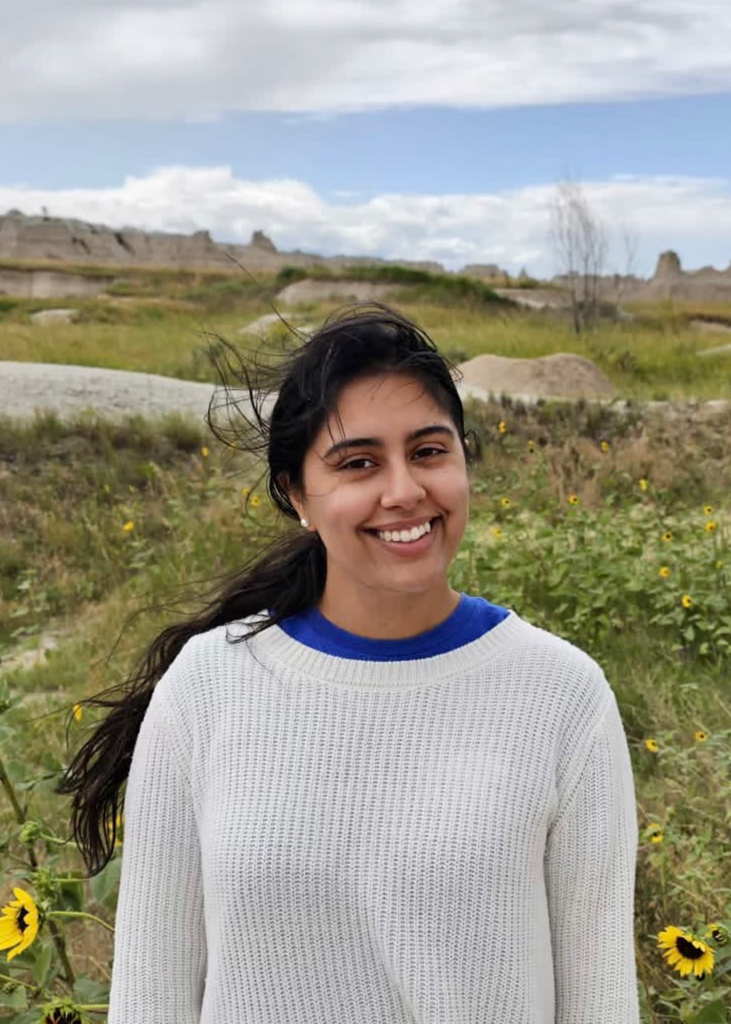The Transformative Food Systems (TFS) Fellowship at the University of Michigan is rooted in the idea that bold leaders are urgently needed who reflect the communities most affected by intertwined environmental, health and economic food systems crises. During the two-year fellowship, TFS Fellows study food systems from diverse disciplinary angles and gain critical skills needed to construct truly transformative food systems that are more equitable, health-promoting and ecologically resilient.

Introducing the Fall 2023 Transformative Food Systems Fellows:
jøn kent ethridge II
Frankie Douglass
Nia Dubon-Robinson



Bio
What is your preferred first name (full name or nickname)?
jøn kent
Where did you grow up?
I was born and raised in Detroit MI, then at 12 I moved to Santa Monica.
Where did you attend undergrad and what was your major?
UCLA, Sociology
How did you become interested in food systems?
When I become aware of the anthropocentric effects on our world and other lifeforms.
What does transforming the food system mean to you?
Setting up an infrastructure for marginalized communities to learn how to grow food for themselves and create pathways for access to quality locally grown produce.
What do you do in your free time?
Travel, watch documentaries, eat, dance, converse, sleep
What University of Michigan program are you in?
Bio
What is your preferred first name (full name or nickname)?
Frankie
Where did you grow up?
New Haven, CT
Where did you attend undergrad and what was your major?
Johnson & Wales University, Culinary Nutrition
How did you become interested in food systems?
Culinary school introduced me to food systems. In addition to my coursework and culinary labs, I also worked in kitchens, at farmers markets, and with food nonprofits. My experiences taught me a lot about the good, bad, and ugly in the food system. Upon graduation, I hungered for work and experiences that would continue to expand my familiarity with food systems.
What does transforming the food system mean to you?
Transforming the food system is an act of rebellion. Transforming the food system is also an act of radical compassion for ourselves, our neighbors, and our land. For me, transforming the food system means changing the world.
What do you do in your free time?
I love to cook. I love to eat. I like to move my body (ice skating, hiking, stretching, etc). I love horror, mystery, and comedy shows and movies. And I like making and consuming art (visual and performance-based).
What University of Michigan program are you in?
Bio
What is your preferred first name (full name or nickname)?
Nia (Nee-ah)
Where did you grow up?
I grew up within the many neighborhoods of Detroit, MI, but now my immediate family resides in Morningside, on the city’s Eastside.
Where did you attend undergrad and what was your major?
I graduated Emory University in 2019 double majoring in Environmental Science and Sociology.
How did you become interested in food systems?
Early on, I became conscious of food systems from visiting my father, a generational coffee farmer in Marcala, La Paz, Honduras. His explanation of biodynamic and agroforestry practices sparked many questions about how other crop-specific regions grow food while considering the ecology of the land. Since then, I have had work experience farming and managing gardens forming a deeper connection to my food system.
How did you become interested in food systems?
To me, transforming food systems requires a collective understanding of the meaning behind land sovereignty. Returning the power of agricultural political and industrial stakeholders to farmers and farmworkers can allow for intentional production to feed communities and regenerate agroecosystems.
What do you do in your free time?
I love to spend time outside on a nice sunny day, cooking for friends and family, and exploring seed catalogs in the winter for the upcoming growing season!
What University of Michigan program are you in?
Sami Maldonado
Sai Cheruvu
Sukhmony Brar



Bio
What is your preferred first name (full name or nickname)?
Sami
Where did you grow up?
Minneapolis, Minnesota
Where did you attend undergrad and what was your major?
University of Minnesota, B.S. in Sustainable Agriculture & Food Systems
How did you become interested in food systems?
When I first learned about food systems from a high school course, I
was excited to finally have a term for what I wanted to do in my life.
I am drawn to the social and environmental impacts of what we eat, and
how food tells a story. Also, systems thinking is valuable to promote
holistic and multifaceted solutions.
What does transforming the food system mean to you?
Transforming the food system starts with sustainable personal and
economic investments towards the environment, agricultural education,
and farmers. Eating is a humanizing and cross-cultural activity, yet
it is easy to distance ourselves from the fundamentals of food. By
choosing to be an active participant in the food system, such as
engaging with a farmer-focused organization, growing your own food, or
simply reading books and news articles, we can be better equipped to
nourish ourselves and advocate for a fair food system.
What do you do in your free time?
I enjoy spending time outdoors, traveling, and visiting ice cream
shops. I also love to be around pets and farm animals.
What University of Michigan program are you in?
Awards: LDEI and The Wine Group Scholarship for Impactful Change
Bio
What is your preferred first name (full name or nickname)?
Saisinzita (Sai) Cheruvu
Where did you grow up?
Houston, Texas
Where did you attend undergrad and what was your major?
University of Texas at Austin as a public health major
How did you become interested in food systems?
My undergraduate thesis focused on understanding the impact of natural farming on agrarian distress in Andhra Pradesh (AP), India. I wanted to highlight the voice of farmers in my work, so I conducted fieldwork with small farmers in the Kadapa district of AP to understand their experience working with the Andhra Pradesh Community Farming (APCNF) initiative. I truly appreciated getting a deeper understanding of climate change adaptations based on indigenous farming practices. This experience with the farmers ignited my curiosity about the broader implications of agrarian distress on the entire food system.
What does transforming the food system mean to you?
Transforming food systems means taking a holistic approach to sustainability, considering environmental, social, economic, and cultural factors. It involves fostering collective actions that empower small farmers and promote community development. By doing so, we create a more inclusive and sustainable food system that benefits both individuals and the planet.
What do you do in your free time?
During my free time, I enjoy reading self-reflective books, journaling to navigate inner conflicts, savoring a cup of tea, and indulging in the timeless pleasure of antiquing for tiny treasures that spark a sense of delight.
What University of Michigan program are you in?
Bio
What is your preferred first name (full name or nickname)?
Sukhmony (SUKH-muh-nee), but you can also call me Sukh!
Where did you grow up?
Bakersfield, CA
Where did you attend undergrad and what was your major?
I attended UC Berkeley where I studied Biology and English Literature
How did you become interested in food systems?
Although I grew up spending weekends at my grandparents’ raisin farm in Delano, CA, I first began to think critically about the food system while studying at UC Berkeley. During my sophomore year, I started volunteering at a student-run, nonprofit grocery store called the Berkeley Student Food Collective. It was in this space that I formed some of my deepest relationships while in college and learned about cooperative models of business, food sovereignty, community organizing, and the practical elements of operating a community-facing grocery store.
What does transforming the food system mean to you?
Transforming the food system means restoring our personal and collective relationships to the land we live on. I believe each of us can transform the food system by engaging in radical (re)education about the historical context of our current food system; participating in community-led efforts to divest from corporate, industrial food systems and invest in community-centric foodways; and practicing reciprocity, collective care, and indigenous and intergenerational ways of knowing to cultivate community resiliency in the midst of climate change.
What do you do in your free time?
I enjoy writing poetry, identifying plants, playing tennis, and sharing food with friends and family!
What University of Michigan program are you in?


